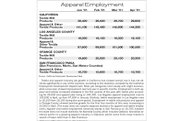California Job Growth Slowing, but Momentum Good in First Quarter
Jack Kyser, chief economist at the Los Angeles County Economic Development Corporation (LAEDC) reports that while the growth of the California job market is slowing down, the economy is still buoyed by the momentum it previously enjoyed. The main concern for the future of the economy is the manner in which the current energy crises will be played out.
“The momentum is carrying us along, but we are still concerned about the next six to nine months,” Kyser said.
“The main concern is the energy situation. For Glendale, Los Angeles and Burbank, there is no concern, because they haven’t had an increase and have plenty of power. But for firms in [Southern California] Edison territory that face the threat of higher power rates and blackouts this summer, there is a very dicey situation.”
An additional concern, according to Kyser, is that firms with out-of-state customers are being pressured to deliver the prices originally quoted before factoring in the increase in energy costs. Companies are being asked to remain competitive, while the competition is becoming more hard-nosed. Kyser said that some out-of-state businesses are telling customers not to buy from California businesses, intimating that the potential for blackouts will cause delays and other difficulties. He also said that California has been besieged by out-of-state raiders who want to lure businesses away from the pressures of power crises.
“Tennessee did a blitz and sent out [promotional] flashlights, saying ’We have plenty of power in Tennessee,’” Kyser said. “This will be a two-year situation and at the end, we will have excess power and the rates will go down. If you go to Tennessee, at the end of the two years, you will be in Tennessee.”
Kyser advises businesses to remain in California, because it is not the only state with the difficulty.
“[Everyone should] “stick with it,” he said. “The energy is becoming a nationwide problem. That was pretty well documented by President Bush. A lot of other states have to worry, especially in the Pacific Northwest. We need a coherent energy policy, which will be difficult to get to since the politicians are busy assigning blame.”
There are some specific items for mitigation that some firms are already taking advantage of, according to Kyser.
“We know a lot of firms are looking at streamlining their operations and improving efficiency. Anyone who hasn’t contacted the California Fashion Association had better do it quickly to get some good input,” he said. “You have to be lean and mean through the summer to be in decent shape.”
The energy problem has also created another concern beyond the higher rates, Kyser warned.
“The other concern is the impact of higher energy prices on consumer spending,” he said. “The Federal Reserve Bank of San Francisco has calculated that the average household will spend $750 more this year on natural gas power. We calculate another $400–$500 on gasoline, due to the increase. Low to medium households will be under a lot of pressure and this will definitely impact the retail industry.”
Kyser surmised that the nation may be able to keep from falling into a recession, based on his tenuous assessment of the remainder of the year.
“There will be slower growth as we move into the summer,” he said. “We expect the Fed to do another interest rate cut, but that won’t get us any new power plants or more natural gas. But hopefully, it will keep the U.S. overall from sliding into a recession, which is the last thing we want.”






















